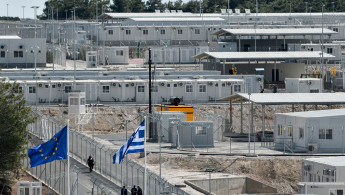Greece inaugurates first 'closed' camp for asylum seekers
Greece on Saturday inaugurated the first of five new "closed" migrant camps, opposed by rights groups who say the strict access measures are too restrictive.
A double barbed wire fence surrounds the 12,000 square metre camp on the island of Samos, which is also installed with surveillance cameras, x-ray scanners and magnetic doors.
The EU has committed 276 million euros ($326 million) for the new camps on Greece's five Aegean islands -- Leros, Lesbos, Kos, Chios as well Samos - that receive most of the migrant arrivals by sea from neighbouring Turkey.
Within the camp is a detention centre, set up for migrants whose asylum claims have been rejected and who are to be sent back to Turkey.
The Samos camp, which will serve as a pilot for the other so-called closed and controlled access facilities, has a detention centre and asylum seekers will only be able to enter via fingerprint scans and electronic badges.
Gates will remain closed at night and disciplinary measures await those who return after eight pm.
The camp boasts sports and games areas, as well as shared kitchens.
Dormitories have five beds each and a cupboard, with shared toilets and showers, an AFP team saw.
"The new closed-controlled access centre will give back the lost dignity to people seeking international protection, but also the necessary conditions of safeguarding and restraint for illegal migrants who are to be returned," Greek Migration Minister Notis Mitarachi said at the opening.
Living conditions
The Leros camp is expected to be finished next month, while on Lesbos - home to Moria, Europe's largest camp, which was destroyed by fire last year - work has yet to begin.
With better quality accommodation, running water, toilets, separate areas for families and more security, the Greek government says that the camps will meet European standards.
They replace facilities that became infamous for their living conditions.
On Samos, the facility near the port of Vathy had been designed for 680 people but at one point was home to nearly 10 times that number.
Asylum seekers still live there - rats, improvised wooden barracks without heating and a lack of toilets and showers continue to be part of their daily lives.
But from Monday, more than 300 residents will be transferred to the new facility five kilometres (three miles) from Samos's main town of the same name.
Τhe old camp is to be closed by month's end.
"This is a promise to the local community, but also a commitment of our ministry," Mitarachi has said, responding to anger among the local community who, for years, watched as the camp ballooned.
Camps should be open
NGOs and aid groups however have raised concerns about the new camps' structure in isolated places and residents' confinement.
Dozens of NGOs, including Amnesty International, accused Greece of pursuing "harmful policies focused on deterring and containing asylum seekers and refugees".
They urged the EU and Greek government to abandon plans to restrict the movement of people in the camps.
The UN refugee agency's representative in Greece, Mireille Girard, also voiced reservations, expressing particular concern at the term "closed camp".
"We have discussed that with the authorities, it was repeated to us this morning that indeed these will be open centres, she added.
"It is very important that in the new facility people are able to move freely in and out of the camp".
Greece was the main point where more than one million asylum seekers - mainly Syrians, Iraqis and Afghans - entered Europe in 2015.
The crisis in Afghanistan has prompted fears of a new migration wave.
According to Mitarachi, the flow of new arrivals has been reduced by 90 percent compared to 2019.
However, humanitarian organisations say the drop is due to illegal pushbacks of migrants by Greek authorities, which the conservative government has repeatedly denied.





 Follow the Middle East's top stories in English at The New Arab on Google News
Follow the Middle East's top stories in English at The New Arab on Google News
![Netanyahu furiously denounced the ICC [Getty]](/sites/default/files/styles/image_330x185/public/2024-11/GettyImages-2169352575.jpg?h=199d8c1f&itok=-vRiruf5)
![Both Hamas and the Palestinian Authority welcomed the ICC arrest warrants [Getty]](/sites/default/files/styles/image_330x185/public/2024-11/GettyImages-2178351173.jpg?h=199d8c1f&itok=TV858iVg)
